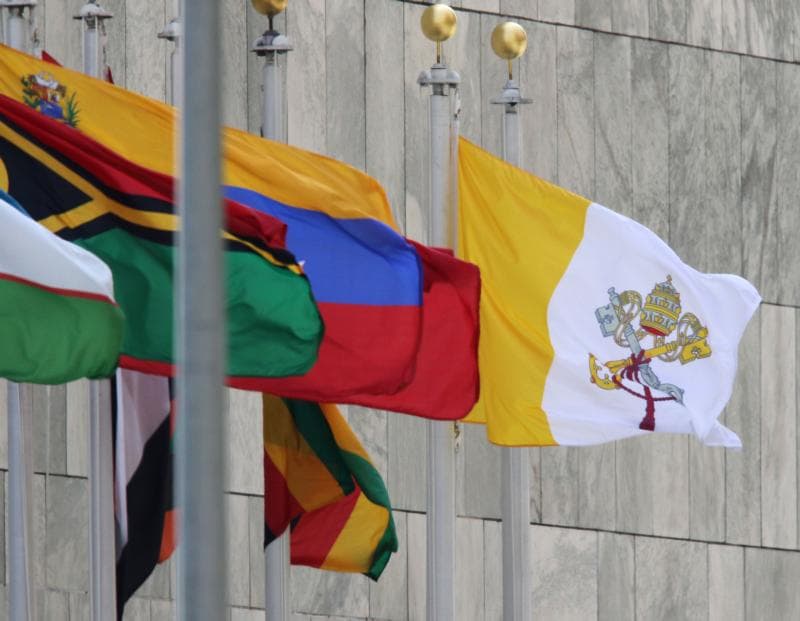ROME – There’s often a “conflict of rights” in Western societies, according to the president of the Vatican’s own legal tribunal, which he said is seen first of all in a confusion between basic “fundamental rights,” such as the right to life and freedom, and “common rights,” such as a right to free speech or freedom of the press.
A certain level of conflict and tension arise when these two categories are confused, said Professor Giuseppe Dalla Torre in an interview with Crux, noting that a sort-of “plurality of rights” develops when a society forcefully claims as inherent human rights things that end up contradicting one another, such as “the right to life and the right to abortion.”
“Contemporary society, especially Western society, which is a secularized, individualist, relativist society, tends to claim them not as rights, but a right as a fundamental right … the property of their desires,” Dalla Torre said, explaining that this then “collides with the rights of others.”
The subsequent clash risks bringing about “the destruction of the idea of a right” altogether, he said, because, “if everything is a right, if my desire becomes a right, then obviously the idea of a right” is devalued.
Dalla Torre stressed that while there’s a need to push for human rights in some areas of the world, “the problem is that if we put them all at the level of a fundamental right – those expectations that must be recognized by all men in every part of the world, in every moment of history – the risk is their banalization, their erosion.”
When this happens, the ultimate goal of fundamental human rights in itself disappears, he said, adding that this “is typical of the Western world. A world that has passed through processes of secularization, of laïcité, of relativism, of individualism, where everyone tries to affirm themselves.”
Rector of Rome’s LUMSA University from 1991-2014, Dalla Torre is a jurist and currently teaches as a professor of jurisprudence, economy, politics and modern languages at the university. He also serves as the president of the tribunal of the Vatican City State, and is a consulter to several Vatican departments.
He will be among experts speaking at a Nov. 15-16 symposium on “Fundamental Rights and Conflicts Among Rights,” which will draw figures from academia and legal fields to discuss the state of human rights in the current global climate, including Princeton Professor Robert George, Harvard Professor Mary Ann Glendon, and New York University Professor Joseph Halevi H. Weiler. The event is being held this week in Rome.
Dalla Torre, who speaks on the first day of the conference following an opening keynote address by Cardinal Angelo Amato, president of the Scientific Committee of the J. Ratzinger/Benedict XVI Foundation, will address the issue of religious freedom as the foundation of all other human rights.
In his comments to Crux, Dalla Torre said that after the right to life, religious freedom is among the most basic assurances that mankind should have, since it deals with the deepest part of one’s identity.
Religious liberty, he said, “is the foundation of other human rights, because in the measure that it claims the truth of the conscience of the individual before the state, it places in the authority of the state a radical limit.”
Paradoxically, religious freedom is a boundary that goes “beyond the state,” and while it was one of the most widely respected rights in the past, it was among the first rights “to be forgotten” in the 16-17th centuries, after the Protestant Reformation.
Looking at the current global climate, Dalla Torre said the threats to religious freedom are present everywhere, but they take different forms in the East versus the West.
On a global level, human rights are violated for some seven out of 10 people, he said, noting that most violations happen in countries such as China, Pakistan or India, which is technically a democratic society, he said, but quipped that “we know well how it is for Christians in some states in India, in particular attitudes that are not respectful of religious freedom.”
In these countries, restrictions on basic rights, including the right to religious freedom, are more overtly repressed. In the West, he said, “it can happen in a much subtler way, much more hidden.”
Dalla Torre said that in some ways, “it’s far more dangerous” to have less obvious attacks on religious liberty. “There is a jurisprudence with the institutional courts of our states, of the European Court of Human Rights, (where) there can be subtle, almost imperceptible forms of persecution for religious reasons,” such as the controversy in some nations over wearing religious symbols in public.
“In the area of jurisprudence of the European Court of Human Rights, every now and then you notice ambiguities,” he said, noting they often place the French concept of laïcité, the insistence on a secular state, in contrast with the freedom to practice one’s religion in public.
In Catholic thought, he said, “the equality of citizens before the law must be guaranteed despite their religious belief.”
The risk, Dalla Torre said, is that secularism is often “taken in an ideological sense, that is, in the anti-religious sense, and singularly there can be sentences that in the name of laïcité limit religious freedom.”
Dalla Torre said that in his view, there is a need for global society as a whole, and particularly the West, to re-evaluate the meaning of human rights and religious freedom, which begins with a redefining of what “fundamental” rights consists of, versus other rights.
“If you don’t start from a positive juris-nationalistic view, as often happens, they are those rights that the state, the United Nations or international organizations, declare as fundamental.” There is then a risk that the number of rights will continue to multiply, he said, thus generating “conflict and confusion.”
In this sense, the concept of law itself should also be re-thought, he said, noting that law is typically understood in one of two ways: “as the manifestation of the strongest, which can also be the state, legislators, or law as an instrument of justice.”
“Justice is to recognize in every human person what is theirs, what renders them worthy humanly, as a person,” he said, noting that after the Second World War, Europe made a strong effort to protect basic human rights with the publication of the United Nations’ 1948 universal declaration on human rights.
“There was a period of great hope” after the war, he said, but noted that “today we are in a different situation.”
While most fundamental human rights are ensured in Western society, he said, there is also a growth in philosophical thought which tends to assert that “no truth exists, (and) neither do truths exist on fundamental values regarding man,” adding that this “puts into difficulty progress in the area of human rights.”















